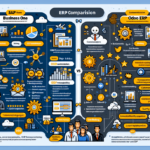Odoo ERP vs SAP Business One: Comprehensive Comparison
Choosing the right Enterprise Resource Planning (ERP) system is crucial for streamlining business operations and enhancing efficiency. Odoo ERP and SAP Business One are two leading solutions that cater to different business needs. This guide provides an in-depth comparison of these platforms, helping you determine which ERP system aligns best with your organizational requirements.
Overview of Odoo ERP and SAP Business One
Odoo ERP
Odoo ERP is an open-source software platform renowned for its modularity and flexibility. It offers a wide array of applications covering areas such as accounting, inventory, sales, project management, and more. Businesses can customize and extend functionalities to fit their specific needs, with deployment options available both on-premise and in the cloud.
SAP Business One
SAP Business One is a comprehensive ERP solution designed for small to midsize enterprises. It integrates key business functions including financial management, sales, purchasing, inventory, and CRM. Known for its robustness and reliability, SAP Business One provides advanced reporting and analytics powered by SAP HANA, catering to businesses with more complex operational demands.
Key Features Comparison
Odoo ERP Features
- Modular Architecture: Start with essential modules and expand as needed.
- Customizable Dashboards and Reports
- Advanced CRM Capabilities for managing customer interactions and sales pipelines
- Integrated Inventory and Warehouse Management
- Multi-Currency and Multi-Language Support for global operations
- Comprehensive HR Management and Payroll Functionality
- Seamless Integration with E-commerce Platforms and Payment Gateways
- Mobile Accessibility via Dedicated App
SAP Business One Features
- Integrated Financial Management and Accounting
- Robust CRM Tools for sales and customer relationship management
- Advanced Inventory and Warehouse Management Systems
- Real-Time Analytics and Reporting with SAP HANA
- Flexible Deployment Options: On-Premise or Cloud-Based
- Industry-Specific Solutions with Prebuilt Templates and Workflows
- Mobile App for On-the-Go Access to Business Data
Pricing Comparison
Pricing structures play a vital role in ERP selection. Odoo ERP offers a flexible, subscription-based model starting at approximately $20 per user per month, with additional costs for specific modules and customizations. This pay-as-you-go approach makes it an attractive option for startups and small businesses looking to manage costs effectively.
In contrast, SAP Business One employs a traditional licensing model with upfront fees for software licenses and ongoing annual maintenance costs. While this can lead to higher initial expenses, it includes comprehensive support and ensures long-term stability, making it suitable for mid-sized companies with more substantial budgets.
According to a Gartner report, companies can expect ROI from ERP investments within 1-3 years, depending on the implementation scale and efficiency gains achieved.
Implementation and Customization
Implementation Process
Odoo ERP offers a streamlined implementation process with the flexibility to deploy modules incrementally. This phased approach minimizes disruptions and allows for adjustments based on evolving business needs.
SAP Business One, while offering a more structured implementation framework, may require a longer deployment period due to its comprehensive nature. However, SAP provides extensive support through certified consultants to ensure a smooth transition.
Customization and Integration
Customization is a key advantage of Odoo ERP, thanks to its open-source architecture. Businesses can tailor the system extensively, integrating new functionalities or modifying existing ones to better fit their processes.
SAP Business One also offers customization through its Software Development Kit (SDK) and supports integration with other SAP products like SAP Ariba and SAP SuccessFactors. While customization options are robust, they are generally more limited compared to Odoo's open-source flexibility.
User Interface and User Experience
A user-friendly interface enhances adoption and efficiency. Odoo ERP boasts a modern, intuitive UI with drag-and-drop functionalities and customizable dashboards, making it accessible for users with varying technical backgrounds.
SAP Business One's interface is more traditional and may present a steeper learning curve. However, it offers comprehensive training resources and documentation to help users navigate its extensive feature set effectively.
Support and Training
Robust support and training are essential for maximizing ERP benefits. Odoo ERP provides multiple support tiers, including 24/7 technical assistance for premium plans. Additionally, it offers extensive online resources, webinars, and community forums for self-guided learning.
SAP Business One delivers structured training programs with various certification levels and dedicated support channels, including online, email, and phone support. This ensures that users receive the necessary guidance to utilize the platform effectively.
Performance and Scalability
Performance is critical for ERP systems to handle business operations smoothly. Odoo ERP performs efficiently for small to medium-sized deployments but may experience latency with a high number of concurrent users or extensive module use. Proper infrastructure and optimization can mitigate these issues.
SAP Business One, powered by SAP HANA's in-memory database, offers superior performance with real-time data processing and analytics, making it highly scalable for growing enterprises requiring robust performance metrics.
Industry Applications
Both ERP systems cater to various industries but have specific strengths:
- Odoo ERP: Ideal for retail, e-commerce, services, manufacturing, nonprofit, and construction sectors, offering tailored modules to address unique industry requirements.
- SAP Business One: Best suited for wholesale and distribution, manufacturing, and service-oriented businesses, providing industry-specific functionalities and compliance features.
Customer Reviews and Ratings
According to user feedback on G2, SAP Business One holds an average rating of 4.2 out of 5, praised for its comprehensive features and reliability. Odoo ERP receives an average rating of 4.0 out of 5, with users highlighting its flexibility and cost-effectiveness. These ratings reflect the platforms' strengths in different operational aspects and user satisfaction levels.
Future Outlook and Development
Both Odoo ERP and SAP Business One continue to evolve, focusing on enhancing user experience and expanding functionalities. Odoo is investing in improved website builders and deeper integrations with third-party applications, while SAP Business One is advancing its analytics capabilities and mobile functionalities to meet modern business demands.
Conclusion: Choosing the Right ERP for Your Business
Selecting between Odoo ERP and SAP Business One depends on your organization's specific needs, budget, and long-term goals. Odoo ERP is ideal for businesses seeking a flexible, customizable, and cost-effective solution with a modular approach. Conversely, SAP Business One is suitable for organizations requiring a robust, reliable system with advanced analytics and comprehensive support.
Evaluate your business requirements, consider the total cost of ownership, and assess the level of customization and support needed to make an informed decision that will drive your business forward.




















